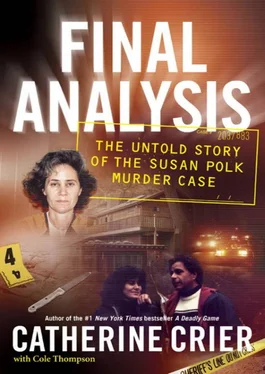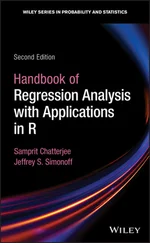“[T]his little boy was screaming something awful. I wanted to cry out but I couldn’t say anything. But the beating was cruel.”
While Bradley disapproved of the physical handling of the boy, she did not interfere, believing that Felix was a therapist and “must know what he is doing.”
“I spent a lot of time around that family and one thing I can tell you, in my lifetime, I never met a more diligent mother, housewife, and assistant to her husband.”
“Thank you for your courage and integrity in coming today,” Susan said.
“I couldn’t live with myself if I didn’t. It breaks my heart. You deserve a better life.”
“I have a brave son like you do, Elizabeth. I have a good life.”
“No further questions.”
Bradley looked to the prosecutor. Sequeira had no questions for the elderly woman. He simply rose and thanked her for coming to court.
Jurors wiped away tears as Susan’s old neighbor rolled her wheelchair out of the courtroom, waving to Susan. “Bye, bye, honey. God bless you.”
Bradley failed to add anything new to the case at hand, but the theatrics meshed brilliantly with Susan’s showmanship. Susan maintained that she had no idea Bradley would come, but she adapted amazingly well to the moment, presenting a surprise witness who had nothing good to say about Felix and nothing bad to say about Susan.
Once back on the stand, Eli continued to bolster his mother’s claims of spousal abuse and her belief that a conspiracy was at work to wrongly convict her of murder.
“He admitted to striking Andy, his son [from his first marriage], and said that’s just the way he was raised,” Eli testified. “He told me his first wife [Sharon Mann] was crazy and delusional, and that’s why they got a divorce.”
The following day, Susan ended her examination and turned the witness over to the prosecutor, but by Friday morning she was demanding a mistrial. Furious at the way Sequeira was cross-examining Eli, she accused the prosecutor of being in cahoots with the judge to discredit the only one of her children to testify on her behalf.
“This is unfair treatment!” Susan said, jumping up at one point to object to Sequeira’s questions about Eli’s criminal past.
“Shame on both of you!” she ranted, directing her anger at both the prosecutor and the judge for their “tricky, nefarious, and devious” actions.
“I fully recognize that watching your son be cross-examined has got to be extremely difficult,” Judge Brady said, adding that the prosecutor’s questions were permissible.
During two days of cross-examination, Sequeira questioned Eli about his run-ins with the police and his on-again off-again relationship with his mother. He intended to poke holes in Eli’s claims that his mother was a victim of abuse, and not a coldhearted killer who stabbed his father in a premeditated rage. Using excerpts from Susan’s diary, Eli’s letters, and his disastrous trip to Paris with Susan when he was a teen, Sequeira stressed the often rocky relationship between mother and son.
Susan’s middle child did little to hide his disdain for the assistant district attorney and the court in which his mother was being tried. His responses to Sequeira’s questions were peppered with sarcasm and he accentuated the word “sir” when he replied to the queries.
With regard to the argument between his parents that had prompted him to strike his mother in the face, Sequeira asked, “Why didn’t you hit the abuser?”
“I don’t know.” Eli replied. He maintained that it was the first time he was ever violent with his mother.
Susan, meanwhile, raised objections when the prosecutor handed her son a copy of the police report that documented another instance of aggression toward his mother. She accused Sequeira of violating the rules of discovery, alleging that he had not provided her with a copy of the report he had just handed Eli. The judge overruled her objection, clearing the way for Sequeira to question Eli about the incident.
The report documented a call to police from Susan after another argument with Eli that turned violent. According to the report, she told police that her son had shoved her out of the house, locked the door, and then took her car without permission.
Eli claimed he couldn’t recall the incident.
Grinning, Sequeira moved on. He next inquired about the fight he had with a fellow teen in the parking lot of a fast-food restaurant that resulted in a felony assault charge. Though Eli insisted it was just a “fistfight,” the prosecutor noted that witnesses told police that Eli struck the victim with a flashlight—a claim Eli denied.
“I hit him four or five times,” Eli said.
“You broke his nose and cut his face up pretty good, didn’t you?” Sequeira noted.
“I object!” Susan jumped up yet again. “He’s attempting to interject hearsay information that hasn’t been established.”
“Would you like to see the medical records?” Sequeira smiled, rummaging through the papers on his table.
“He doesn’t even have them!” Susan shot back, watching as the prosecutor fumbled to retrieve the document.
“He’s attempting to confuse and mislead the jury,” Susan complained to Judge Brady out of earshot of jurors, “when the most important part of this young man’s testimony is that his father was violent, and that his father threatened to kill me.”
But Sequeira wasn’t finished with Eli’s rap sheet. There was the October 2003 incident in which he shot a passing motorist with a pellet gun. The bullet lodged inches from the man’s spine.
Eli insisted he struck the man by accident. He wasn’t aiming at anything in particular when he fired the weapon toward the road. “I was sorry. Accidents do happen. That was a terrible one.”
Sequeira also cited the high-speed car chase in which Eli attempted to elude officers, reaching speeds of 130 mph in his attempt to ditch the bag of marijuana he had in his Camaro.
“And then I pulled over,” Eli insisted of the October 2003 incident.
“You had a flat tire.” Sequeira pointed out.
“I was between homes,” Eli protested. “Things were going very badly. I made some mistakes.”
Sequeira also called the jury’s attention to Eli’s troubles in school, noting that he had been suspended from Miramonte High for making racist and homophobic remarks. It was a calculated strategy to portray Susan’s ally as the bad seed. Using Eli’s record against him, Sequeira cast sufficient doubt on his credibility, demonstrating the witness to be an unreliable person whose words were equally unreliable.
Continuing on, Sequeira raised questions about Eli’s allegiance to Susan, pointing out that he seemed to side with his mother when it was convenient. Supporting Sequeira’s claim was Eli’s aborted trip to Paris with his mother, as well as the March 2001 police report in which Eli sided with Felix, telling officers that he witnessed Susan kick his dad during an argument.
“I did what my father told me to do,” Eli defended. He now related that day’s events differently, saying that his father had attacked his mother, shoved her up against the Sub-Zero refrigerator and ordered him to tell police that she had instigated the fight.
Sequeira paused to let jurors digest the information. “And sometimes you do what your mother tells you to do?” he asked.
“Yes.”
“And you told a third version, too, didn’t you?”
Tossing his hands in the air, Eli blurted out, “I don’t know. I’m lost.”
Striding to the witness box, Sequeira presented the young man with a transcript from a July 2003 conversation with his mother’s former defense investigator in which he claimed that it was his father who kicked his mother that day.
Читать дальше











